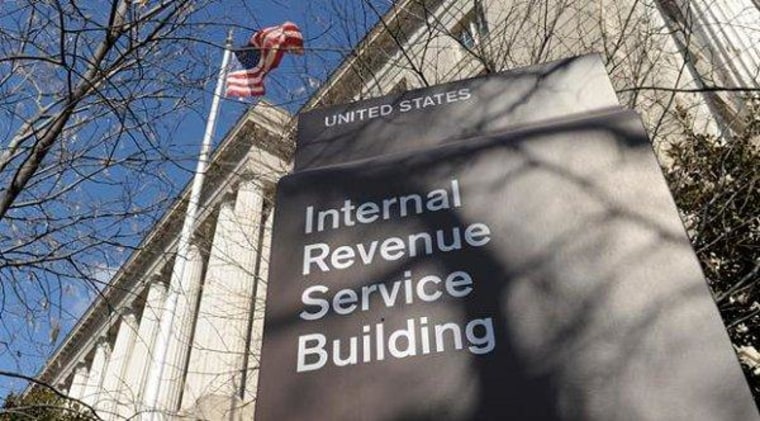Over the years, the political world has seen plenty of scandals come and go, but I can't think of the last time a controversy flamed out as quickly and thoroughly as the IRS story. When the issue first broke in early May, we immediate talk about a Nixonian crisis that could bring down the White House, with pundits and politicians eagerly comparing it to the worst political scandals in history.
And then, all of a sudden, reality intruded and the controversy evaporated.
For Republicans, the problem is every central claim has been discredited. They said conservative groups seeking tax-exempt status were singled out for excessive IRS scrutiny, but we now know that wasn't true. They said conservative groups faced delays that liberal groups didn't have to endure, but that wasn't true, either. They said President Obama's critics were unfairly targeted, and that's ridiculously untrue.
Indeed, the irony of this week is that the previous allegations have not only been answered in a way that ends the discussion, but also that there are new allegations that turn the tables -- those who pushed the scandal are suddenly the ones who need to explain themselves.
The Treasury inspector general (IG) whose report helped drive the IRS targeting controversy says it limited its examination to conservative groups because of a request from House Republicans.A spokesman for Russell George, Treasury's inspector general for tax administration, said they were asked by House Oversight Chairman Darrell Issa (R-Calif.) "to narrowly focus on Tea Party organizations."
This is important. The IG's report helped create the scandal, pointing to special scrutiny applied to Tea Party groups, but ignoring comparable scrutiny of progressive organizations that didn't fully come to light until this week. Why didn't the Inspector General provide a fairer, more accurate, and more encompassing report? Because according to the IG himself, Republicans told him to paint an incomplete picture on purpose.
The whole story, the IG's office said yesterday, "was outside the scope" of the audit requested by Republican lawmakers.
And with that in mind, in an unexpected twist, the congressional Republicans who relied so heavily on the IG's office to help create the controversy suddenly find themselves at odds with their ostensible ally.
House Republicans on Wednesday pushed back on an inspector general's suggestion that the GOP asked for a limited inquiry into the Internal Revenue Service's targeting of conservative groups, a statement Democrats have jumped on in recent days.GOP lawmakers and staffers acknowledge that they reached out to Treasury's inspector general for tax administration (TIGTA) after hearing that Tea Party organizations seeking tax-exempt status felt they were being mistreated by the tax agency.But Republicans also say that it made no sense for them to try to limit the inquiry to the Tea Party, because a broader inquiry would be needed to determine whether the IRS was treating conservative groups more harshly than other groups.
So the IG's office is blaming Republicans and Republicans are blaming the IG's office. Seven weeks after the political world pondered the prospect of president impeachment as a result of this story, it appears the only folks who aren't accused of doing anything wrong are President Obama, his staff, and Democrats.
It's funny how these things turn out, isn't it?
Of course, the next question is who's right about the party responsible for screwing up so badly: the Inspector General or congressional Republicans. At this point, it's difficult to say with certainty, but it's probably best not to reflexively blame GOP lawmakers.
Garance Franke-Ruta had a very interesting report on Tuesday on J. Russell George, the George W. Bush appointee who leads the IG's office and who helped Republicans create the controversy with his misleading report. George now appears eager to pass the buck, but as Garance reported, the inspector general "might not be the impartial arbiter he successfully presented himself to be," and may not have given accurate answers during his sworn testimony.
In May, George declined to answer questions about whether progressive groups were targeted, a kind cageyness that now raises questions about his impartiality in presenting findings about what went on at the IRS.At the May 22 House Oversight and Government Reform Committee hearing "The IRS: Targeting Americans for Their Beliefs," Chairman Darrell Issa asked George point-blank about "be on the lookout" orders: "Were there any BOLOs issued for progressive groups, liberal groups?""Sir, this is a very important question," the courtly George replied. "Please, I beg your indulgence .... The only 'be on the lookout,' that is BOLO, used to refer cases for political review were the ones that we described within our report.""There were other BOLOs used for other purposes," he added -- such as "indicators of known fraud schemes" and, for "nationwide organizations, there were notes to refer state and local chapters to the same reviewers."He did not mention the one now revealed for progressive groups.
Making matters worse, the Huffington Post's Sam Stein also reported this week that Gregory D. Kutz, one of the main authors of George's IG report, "had been relieved of" his previous position as head of the special investigations unit at the Government Accountability Office when he wrote an incomplete report and was accused by a colleague of "pursuing overly sensationalist stories."*
So, there may be a legitimate controversy here after all. It's just not the one the political world was obsessed with since early May. The trajectory is eerily similar to Benghazi: Darrell Issa and Republicans make serious charges, the charges are debunked, and the only remaining questions deal with allegations of Republican wrongdoing.
As for the pundits and politicians who spent seven weeks breathlessly speculating about Obama using the IRS as a political weapon to punish his enemies, we're still waiting for those corrections.
Looking ahead, the House Ways and Means Committee will have a hearing this afternoon on IRS developments, and it seems safe to expect Democrats to be on the offensive, demanding answers.
* corrected
